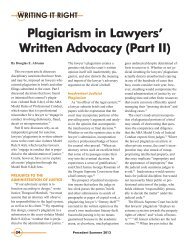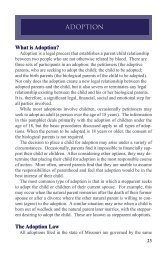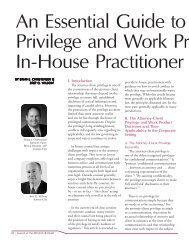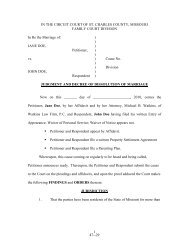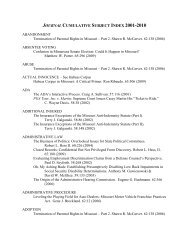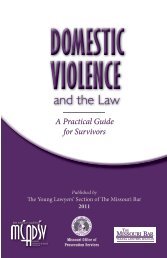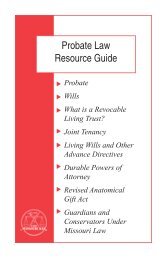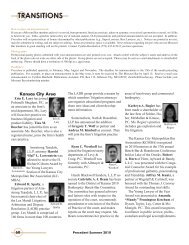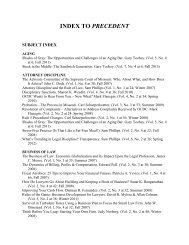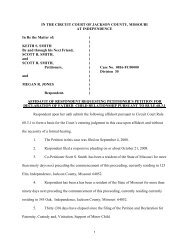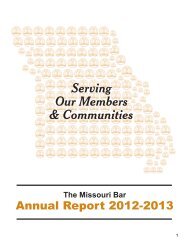Victim Confidentiality Laws Promote Safety and ... - the Missouri Bar
Victim Confidentiality Laws Promote Safety and ... - the Missouri Bar
Victim Confidentiality Laws Promote Safety and ... - the Missouri Bar
You also want an ePaper? Increase the reach of your titles
YUMPU automatically turns print PDFs into web optimized ePapers that Google loves.
underlying <strong>the</strong> statute should be<br />
considered in civil cases as well.<br />
It is worth pointing out that<br />
§ 566.226 does not specifically require<br />
that <strong>the</strong> “victim” be defined only as<br />
<strong>the</strong> named victim in <strong>the</strong> case at h<strong>and</strong>,<br />
allowing for broad application of <strong>the</strong><br />
protection of anonymity in <strong>the</strong> public<br />
record. If <strong>the</strong> mo<strong>the</strong>r of <strong>the</strong> victim<br />
in a child molestation case discloses<br />
that she was physically abused by <strong>the</strong><br />
offender at some time in <strong>the</strong> past, it<br />
can be argued that she is a victim of<br />
domestic assault <strong>and</strong> is, <strong>the</strong>refore,<br />
entitled to protection under <strong>the</strong><br />
statute, even though she may have<br />
never reported <strong>the</strong> abuse. Regardless<br />
of her history, <strong>the</strong> mo<strong>the</strong>r of <strong>the</strong><br />
victim should not be identified by<br />
name in public documents, because<br />
to name <strong>the</strong> mo<strong>the</strong>r is to disclose <strong>the</strong><br />
identity of <strong>the</strong> victim, a violation of<br />
§ 566.226. Note, again, that <strong>the</strong><br />
statute requires redaction of “any<br />
information contained in any court<br />
record … that could be used to<br />
identify or locate any victim. . . .” 13<br />
As for <strong>the</strong> S<strong>and</strong>usky victims’<br />
request to use pseudonyms in <strong>the</strong><br />
courtroom, <strong>the</strong>y may have fared better<br />
in <strong>Missouri</strong>, as § 566.226 would<br />
seem on its face to allow a victim of<br />
domestic or sexual assault or stalking<br />
to avoid public identification in any<br />
hearing or trial, based on <strong>the</strong> fact that<br />
a public record results from <strong>the</strong>se<br />
proceedings. On <strong>the</strong> o<strong>the</strong>r h<strong>and</strong>,<br />
it can be argued that § 566.226<br />
anticipates <strong>the</strong> presence of protected<br />
information in <strong>the</strong> court record<br />
that is <strong>the</strong> basis for <strong>the</strong> m<strong>and</strong>ated<br />
redaction <strong>and</strong> <strong>the</strong> rationale behind<br />
Court Operating Rule 5.11. 14 It is<br />
not possible to fully prevent <strong>the</strong> entry<br />
of protected information into <strong>the</strong><br />
court record, but <strong>the</strong> use of initials is<br />
one practical method of minimizing<br />
<strong>the</strong> problem. A narrow <strong>and</strong> literal<br />
interpretation of § 566.226 suggests<br />
that its focus is to prevent public<br />
disclosure of protected information<br />
in <strong>the</strong> court record, not necessarily to<br />
prevent protected information from<br />
being entered into <strong>the</strong> court record.<br />
This is contradictory, however, to <strong>the</strong><br />
overall purpose of <strong>the</strong> statute.<br />
There is solid precedent for<br />
a common-sense approach to<br />
interpretation of <strong>the</strong> statute in <strong>the</strong><br />
case of Sykes v. State. 15 Sykes was<br />
charged “with <strong>the</strong> class B felony<br />
of recklessly exposing ano<strong>the</strong>r to<br />
human immunodeficiency virus<br />
(HIV) infection without that person’s<br />
knowledge or consent.” 16 Since only<br />
victims of domestic or sexual assault<br />
or stalking are protected under<br />
§ 566.226, <strong>the</strong> court was not<br />
obligated to keep <strong>the</strong> victim’s name<br />
confidential. Wisely, <strong>the</strong> court noted,<br />
“[a]lthough not required by section<br />
566.226, RSMo Cum.Supp.2011, we<br />
exercise our discretion <strong>and</strong> use initials<br />
when identifying <strong>the</strong> victim in this<br />
case.” 17 The court clearly recognized<br />
<strong>the</strong> importance of protecting<br />
this victim from <strong>the</strong> potential<br />
embarrassment of public stigma that<br />
often attaches to being identified as<br />
HIV positive. This voluntary redaction<br />
of <strong>the</strong> victim’s name reflects that a<br />
victim’s right to dignity <strong>and</strong> privacy is<br />
paramount. While <strong>the</strong> physical safety<br />
of a victim is critical, dignity <strong>and</strong><br />
privacy also fall within <strong>the</strong> spirit of <strong>the</strong><br />
statute <strong>and</strong> <strong>the</strong> discretion of <strong>the</strong> court.<br />
A second example is found in<br />
State v. McGinnis. 18 In McGinnis, <strong>the</strong><br />
only issue on appeal was burglary,<br />
not domestic or sexual assault or<br />
stalking, <strong>and</strong> yet <strong>the</strong> court assigned<br />
fictional names to a murder victim<br />
<strong>and</strong> a rape victim, calling <strong>the</strong>m<br />
“Simon” <strong>and</strong> “Kathy.” 19 The court<br />
held that by using fictitious names, it<br />
was in compliance with § 566.226. 20<br />
McGinnis murdered his friend Simon<br />
<strong>and</strong> <strong>the</strong>n went to Simon’s house to<br />
rape Simon’s wife, Kathy. 21 As a victim<br />
of rape, her identity in <strong>the</strong> burglary<br />
case was protected by § 566.226,<br />
<strong>and</strong> since identifying her deceased<br />
husb<strong>and</strong> by name would also reveal<br />
her identity, both victims’ names were<br />
withheld from <strong>the</strong> court record.<br />
Section 566.226 addresses only<br />
<strong>the</strong> court record <strong>and</strong> not documents<br />
provided in discovery apart from this<br />
public record. Many victims find<br />
it highly disconcerting that <strong>the</strong>ir<br />
addresses are provided in discovery<br />
to criminal defendants. While <strong>the</strong><br />
spirit of § 566.226 validates <strong>the</strong>se<br />
concerns, in written form it is limited<br />
to redaction of sensitive information<br />
from only <strong>the</strong> court record. <strong>Victim</strong>s<br />
in search of safe harbor from abusive,<br />
controlling defendants can find<br />
relief under § 455.020.1 if <strong>the</strong>y<br />
avail <strong>the</strong>mselves of <strong>the</strong> services of a<br />
domestic violence shelter, but many<br />
victims do not stay at a shelter. 22<br />
Regardless of whe<strong>the</strong>r a victim<br />
of abuse resides temporarily at a<br />
domestic violence shelter, additional<br />
provisions for address confidentiality<br />
are offered by <strong>the</strong> “Safe at Home”<br />
program discussed below.<br />
Domestic Violence Shelters:<br />
§ 455.020.1<br />
Section 455.220.1 requires strict<br />
confidentiality for domestic abuse<br />
shelters. 23 No one who volunteers<br />
for or is employed by a shelter<br />
may confirm <strong>the</strong> identity of shelter<br />
residents to third parties, including<br />
law enforcement agencies. The level<br />
of confidentiality that applies to<br />
domestic abuse shelters is so high that<br />
it is pointless for law enforcement<br />
officers to attempt to deliver a<br />
subpoena to a resident of a domestic<br />
abuse shelter because that would<br />
require someone to answer <strong>the</strong> door<br />
<strong>and</strong> confirm that a certain person is,<br />
in fact, on <strong>the</strong> premises. Shelter staff<br />
may not provide testimony or respond<br />
to subpoenas duces tecum to produce<br />
records. State ex rel. Hope House, Inc.<br />
v. Merrigan brings this message home<br />
with impactful language from <strong>the</strong><br />
Supreme Court of <strong>Missouri</strong>. 24<br />
78 / Journal of <strong>the</strong> MISSOURI BAR



